temple
Posts by :
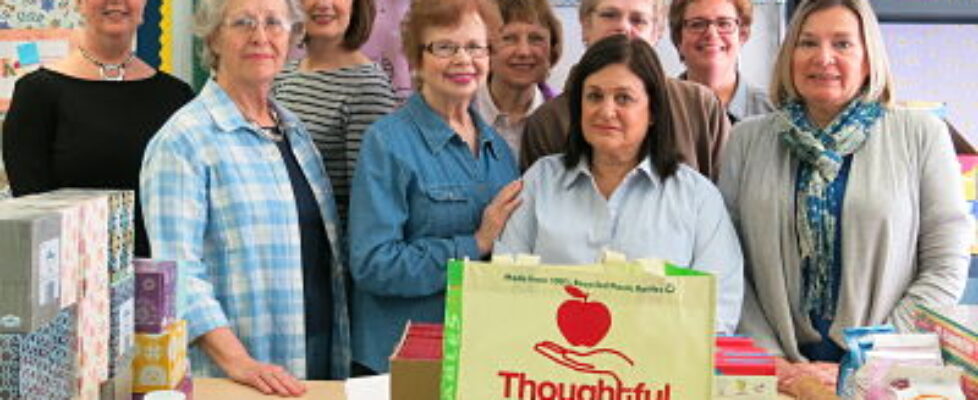
Thoughtful Thursdays Committee: Combining Social Time With Social Action
There’s a rhythm to the activities in Room 106 when the Thoughtful Thursdays team assembles. The conversations begin almost as soon as the volunteers arrive, with only a few pauses along the way for instructions about the cans, bottles, packages, and educational lessons that will be included in the bags for 86 Temple Head Start students.
The assembly line soon reaches full steam. Bags are filled and then moved next door to the Head Start office until the task is complete. An inventory for the next bag is later taken and plans are made for the coming month.
The atmosphere is comfortable, collaborative, and productive. Perhaps that’s why a dozen or more volunteers from Achduth Vesholom, B’nai Jacob, and the Jewish Federation of Fort Wayne help on a given morning to assemble Thoughtful Thursdays’ bags.
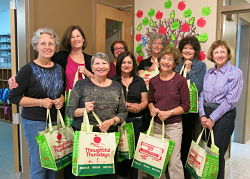 “We have a purpose, but we’re also a social group,” says Chair Jamie Berger, who co-founded the nationally recognized project and frequently makes several trips a week to the Temple to drop off items for the bags. “Social action is our mission, but the social part is key, too. We have a big core group.”
“We have a purpose, but we’re also a social group,” says Chair Jamie Berger, who co-founded the nationally recognized project and frequently makes several trips a week to the Temple to drop off items for the bags. “Social action is our mission, but the social part is key, too. We have a big core group.”
Federation President Fran Adler explains: “It’s fun to get together and visit with people and feel you’re helping the community at the same time.”
The group will prepare the final bags of the school year on May 6, completing its fifth year of service later this month by sending large packs of toilet paper home with the Head Start families. While the social part of their work comes mainly during bag assembly mornings, the Thoughtful Thursdays team includes many more volunteers than the ones dubbed the “Bag Ladies.”
Under Jamie’s leadership, the mitzvah project involves the efforts of many. Kathy Sider and Cindi Wismer are among the shoppers who look for bargains and then schlep dozens of items to the Temple. Kay Safirstein has a knack for buying child-friendly items and tissues. Arlene Leib finds bargains on jello and pudding. Jan Finkel arrives early on assembly days to make sure everything is organized. Ongoing help comes from Jaki Schreier, Micki Kepes, and Bonnie Smith.
The gathering of items is not as easy as it seems, such as when the team needs 86 winter hats and gloves within budget or needs to transport 86+ rotisserie chickens from Sam’s Club for the Head Start students and staff.

![]()
_opt.jpg) Jordan Berger, who co-founded Thoughtful Thursdays with her mother, continues to assist while away at Cornell University by writing grants to help fund the project. The Dr. Harry W. Salon Foundation contributes generously, along with many members of the Jewish community and local businesses.
Jordan Berger, who co-founded Thoughtful Thursdays with her mother, continues to assist while away at Cornell University by writing grants to help fund the project. The Dr. Harry W. Salon Foundation contributes generously, along with many members of the Jewish community and local businesses.
Janet Katz has a relationship with local farmers to provide fresh produce. Jan Sarratore, a retired teacher, creates educational activities and works with Head Start parents and teachers to share ways to foster learning. Talia Bugel translates the materials into Spanish. Cindi Wismer creates recipe cards, shops online for bargains, and helps with organization.
“One of the perks of working on Thoughtful Thursdays is the immediate effect that this social action project has on the families,” Cindi says. “This bridges nutrition with education, as well as provides hands-on help with adult literacy to help preschoolers.”
The Junior Youth Group has gotten involved collecting items and assembling projects. Rita O’Neill sponsors the turkey giveaways at holiday time. Martha Replane helps with correspondence. Beth Zweig takes photos to promote the program. Many volunteers bake for parent appreciation luncheons. Temple staff members Sally Trotter, Bonnie Crubaugh, Bonnie Pomerantz, and Clint Rossiter also go the extra mile to assist.
Jamie hopes the tikkun olam effort continues to capture the enthusiasm of the Jewish community when Thoughtful Thursdays begins again next school year. More volunteers are welcome.
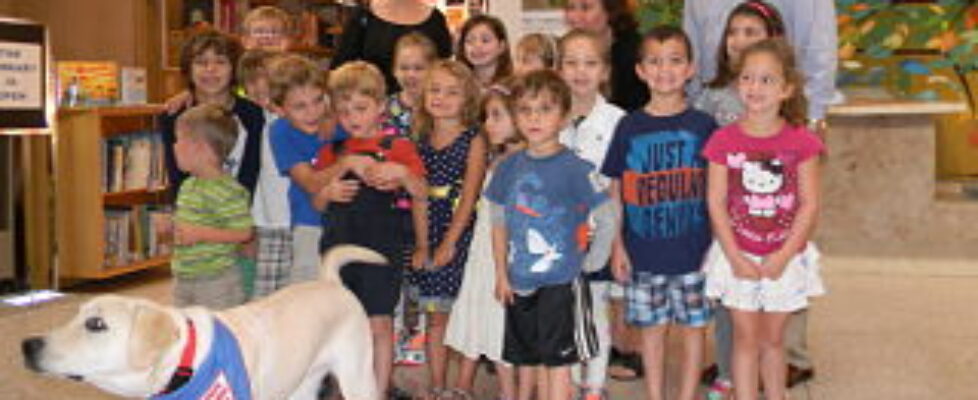
Training Puppies: The Gift of Independence
Deborah and Michael Worpell never expected to be training a puppy in their spare time – especially now that their children are in college. But at the urging of a friend who is legally blind, the Temple members got involved in 2012 with Leader Dogs for the Blind.
“We’d been talking about how we always had dogs, but after we had to put ours down, we said…we can’t take the heartache even though we missed having a pet,” said Deborah. “Our friend Jim suggested that we look at being a puppy raiser for Leader Dogs. We have a puppy for 12 to 15 months, teach good manners and social graces, and then we return them for further training, and we can get another puppy.”
Founded in 1939 by three Detroit-area Lions Club members, Leader Dogs for the Blind helps people who are blind, visually impaired, or Deaf-Blind. According to the organization’s website, the group helps “with skills for a lifetime of independent travel, opening doors that may seem to have closed with the loss of sight.”
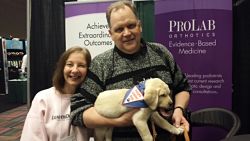
Deborah said the dogs are trained to assist the visually impaired all over the world, including in Israel. There is no charge to the client for the dog, transportation or training.
“The most rewarding part for us is knowing you’ll give someone the gift of independence and security,” she said. “Raising the puppies is our ongoing mitzvah!”
Deborah said Shannon goes to work with her and Michael at his podiatry office. She said puppy raisers give basic training and obedience lessons, including ho wto sit, stay, down, leave it, and how to walk nicely on a leash through all situations. The trainers are responsible for taking puppies wherever they go so the puppies get used to sights, sounds, and crowds. After the full 12-15 months of training, she said, the puppy is returned to Leader Dogs for their formal training.
Once a puppy returns to Leader Dogs and has been successfully training, Deborah said, the puppy is matched with a client and spends another month at Leader Dogs being trained to work together. It is up to the client whether to meet the puppy raiser and stay in touch. If for some reason, the puppy does not make it through the program, he is placed in another type of service situation or the puppy raiser is allowed to adopt the puppy.
Deobrah and Michael go to a local puppy training session once a month in the Fort Wayne area where they meet other puppy raisers and a counselor. They go to Rochester Hills every other month for a weekend of training.
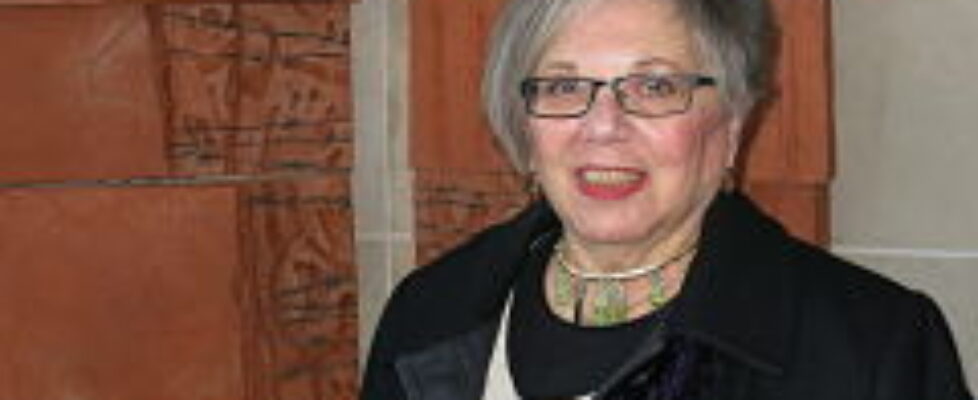
Rena Black: Keeping The Story of the Holocaust Alive
It’s important to Rena Black that the history of the Holocaust and its lessons are not forgotten. As the new chair of the Temple’s Holocaust Education Committee, Rena has a personal connection that informs her involvement.
Her father Curt Stein left Germany in the early 1930s to live in the United States. After the Nazis started requiring all Jews to wear yellow Stars of David and closed their schools to Jewish students, other family members fled their homes in Worms. Rena’s Uncle Henry and her grandparents Julius and Irmgard Stein came directly to the U.S., while her aunt Gerda Schmitz went to South America. Many of their extended family members weren’t fortunate enough to escape.
“As people in the surviving generation are passing away, it’s incumbent on the rest of us to keep the story alive, make sure history is not lost, and put it in the context of new uprisings, especially in Europe,” she said.
Rena, a long-time congregant and local Realtor, was appointed chair in January. She succeeds her mother, Betty Stein, who had led the Holocaust Education Committee since its inception some 30 years ago with assistance from the late Jo Rothberg.
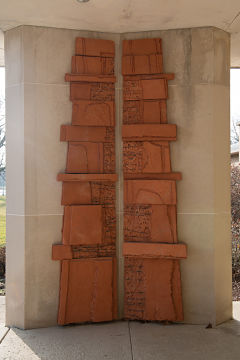

With the long-term planning needed for the symposium, 98-year-old Betty said she felt it was time to pass the torch as chair of the committee. She said that her daughter’s sense of integrity and family background will help Rena take on the task of sharing the lessons of the Holocaust.
“We must get people to remember, but also to live by it,” Betty said. “When you see injustice, don’t just look at it. It’s part of Judaism, an imperative. You’ve got to fight against stuff like that and do something about it. The Holocaust committee’s job is to remind people so something like this is never repeated, to learn that you have speak up about injustice.”
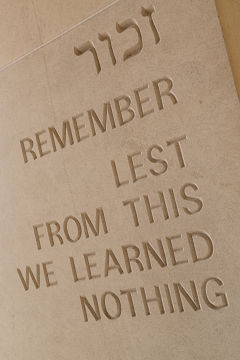
The committee has materials available for use by local schools that include a classroom set of Elie Wiesel’s “Night” and “I Never Saw Another Butterfly,” as well as a DVD of local Holocaust survivors telling their stories (available online at http://www.ipfw.edu/ihgs/). Holocaust Committee members include Betty Stein, Fran Adler, Jaki Schreier, and Steve Carr.
Rena said the committee is in the process of forming a Speakers Bureau to field requests from area schools, churches, and business organizations. She said training is planned so that speakers can give similar and professional presentations.


